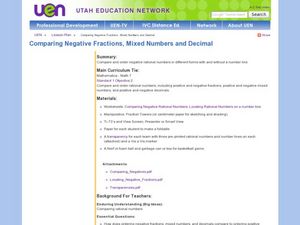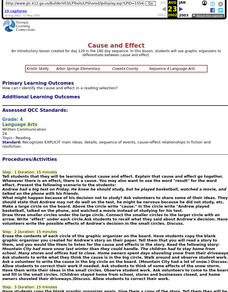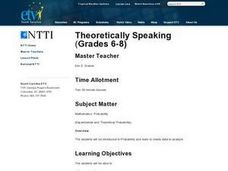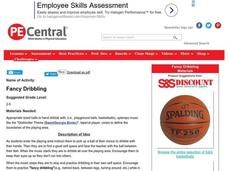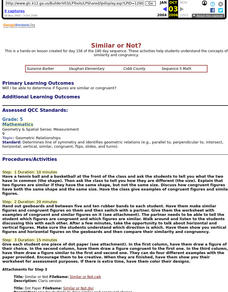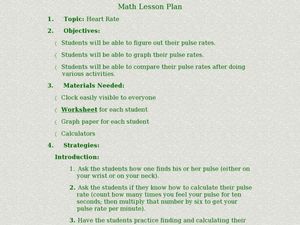Curated OER
Scale Models to Planet Size
Students consider the comparative sizes of the planets in the solar system. In this scale lesson, students select balls of different sizes to represent the planets in the solar system.
Curated OER
Philanthropy: What Is It?
Young scholars explore the concept of philanthropy. In this service learning lesson, students hear stories of philanthropists, discuss what philanthropy is, and create a philanthropy poster.
Curated OER
Water and Ice: Part 1
Learners observe the state changes in water. In this matter lesson, students observe, measure, and describe water as it changes state. Learners explore how water can change from a solid to a liquid then back again. They journal their...
Curated OER
Comparing Negative Fractions, Mixed Numbers and Decimal
Seventh graders explore the concept of negative rational numbers. For this negative rational numbers lesson, 7th graders discuss similarities between positive and negative rational numbers. Students predict what rational numbers lie...
Curated OER
Was That Fair?
Students discuss the concept of fairness. In this fairness lesson, students look at different scenarios and see if the behavior seems fair. They talk about their answers with their classmates.
Curated OER
Probability and Statistics
Students are taught to search the internet for statistics concepts on sports. In this probability instructional activity, students collect data and use the calculator to graph and analyze their data. They graph and make predictions about...
Curated OER
Cause and Effect
Fourth graders use graphic organizers to differentiate between cause and effect. They read a story independently and write the cause and effects in the graphic organizer.
Curated OER
Movement concepts
Students recognize the connection between food labels and exercise. In this health lesson, students understand how many times they need to dribble to work off a snack. Students answer questions about the exercise.
Curated OER
Teambuilding
Students work together as a team to create a birdhouse. This activity show students that each member of a team has a specific responsibility and job to perform. They compare the houses built by the different teams.
Curated OER
Four Square
Pupils, as "Big Buddies", teach little buddies the rules and play with them. They review rules for four square and practice. They talk about playing gently when they are teachers and answer questions as they come up, and encourage...
Curated OER
Zooming In!
Students observe an area of the schoolground, choosing a particular viewpoint or line of vision. At various times, students take photographs and videos of the observed area. Students write a news article based upon their observations.
Curated OER
Theoretically Speaking
Middle schoolers define probability. They determine outcome from a given situation based on simple probability. Students create experimental data using a coin and a number cube. They write how theoretical and experimental probability are...
Curated OER
Sports
Young scholars understand that elements of sport and/or physical exercise are important aspects of certain jobs. In this sports lesson plan, students discuss sport related careers, listen to speakers who have sport related careers, and...
Curated OER
Offensive and Defensive Strategies
Third graders are introduced to offensive and defensive strategies in the game of soccer. They, in groups, develop their own strategies, write them down for presentation to the instructor and try them out against an opposing team.
Curated OER
Farm Census
Students disuss the work of a farmer. They recognize and name farm animals to represent the information in a pictogram.
Curated OER
Zoo Parade Days
Students practice proper throwing and catching activities, different locomotor activities and cooperative activities.
Curated OER
Fancy Dribbling
Students enter the playing area and pick up a ball of their choice to dribble. Then find a good self space and face the teacher with the ball between their feet. When the music starts they are to dribble all over the playing area.
Curated OER
Similar or Not?
Fifth graders define the meaning of similar and congruent using concrete objects. They make similar and congruent figures using geoboards. They draw their figures on dot paper, and color their designs.
Curated OER
Nature of Game Balls
Fourth graders see how, when balls are dropped from the same height, mass and size affects the motion of the balls.
Curated OER
How Can You Detect the Invisible?
Students participate in a lab activity in which they examine the characteristics of radon. They identify radon's link to cases of lung cancer. They complete a radon fact sheet and answer questions to end the activity.
Curated OER
Types of Groups
Middle schoolers are introduced to the various types of groups in a society. In groups, they create a chart showing the similarities and differences between primary, secondary, and reference groups. Using magazines, they cut out...
Curated OER
Graphing Heart Rates
Students explore heart rates. They record pulse rates, predict which exercises cause a faster heart rate, make a chart, and graph the results. Students write an essay using the data to support their predictions. They write a hypothesis...
Other popular searches
- Elementary Basketball Skills
- Basketball Skills Test
- Teaching Basketball Skills
- Pe Basketball Skills
- Basketball Skills Passing





